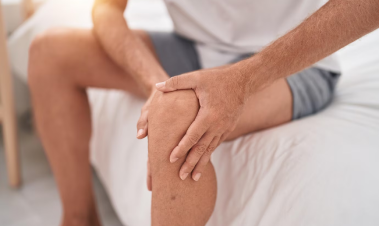The knee is the largest joint in the human body, and is one of the most needed joints in our day-to-daylives. It is a pivotal joint that moves in only one direction but also allows some twisting.
Movements like climbing, walking, sitting, cycling, etc. everything requires our knee to function, and because it is so extensively used in our day to lives it can be exposed to certain kinds of tear and wear.
The knee joint is formed of 3 bones in the body:
1.The Lower end of the thigh bone, or femur
2.The Upper end of the shin bone, or tibia
3.Kneecap, or patella
Knee Deformities
Osteoarthritis: The leading cause of knee pain is osteoarthritis and is also named degenerative arthritis because it is a “wearing out” condition. When cartilage is worn out, the bones rub against each other, causing significant pain, stiffness and swelling.
Rheumatoid Arthritis: Another common cause of knee pain is rheumatoid arthritis where chemical changes are produced in the lining of the joints& it becomes thickened and inflamed. Eventually, the result is cartilage loss, pain, and stiffness.
In case you are facing such deformities make sure not to waste time but consulting the Top Joint Replacement Hospital in Delhi and get diagnosed to know the exact cause of your pain.
When is knee replacement needed?
If you have already tested all the recommendations your doctor has made, but still the pain and stiffness are becoming a hurdle in your day-to-day activities, then it is time to consult with the Best Orthopaedic Doctors in Delhi and get an opinion on total knee replacement. The decision to have a knee replacement surgery is made considering certain factors like:
1.Pain – which is affecting your activities of daily living, your walking, or even sleep
2.Swelling – not improving with rest or medications
3.Stiffness – inability to bend or straighten the knee has become a permanent problem
4.No improvement with medications, therapy, or knee injections, or physiotherapy
5.Degree of deformity is increasing daily
Diagnosis:
1.Physical examination: Medical history, symptoms& level of pain, muscle strength, joint motion, and knee alignment, blood tests and other laboratory tests
2.Radiographic Evaluation: X-rays, Magnetic Resonance Imaging (MRI)
How is knee replacement done- An Overview
If you are undergoing total knee replacement in the Top Hospital in Delhi, your surgeon will consider certain facts and procedures before performing the actual surgery.
Complete Physical Examination:The doctor recommends a complete examination along with some tests like blood test, an EKG, and a chest x-ray.
Surgical Consultation:The doctor will brief you through the procedure and answer any questions you have in mind. Doctor will also review the test results from your physical examination that will let the surgeon know of any allergies or the medications you are currently taking.
Total Knee Replacement Surgery - Post-Operative Care/ Rehabilitation
Once the surgery is completed, you may observe the following things:
1.A drain near incision to collect the drainage and keep a check on the discharged amount
2.Elastic hose or compression stockings to minimize the instance of blood clots
3.Bandage covering the incision area to hygiene and prevent infection
4.Pain pump to manage pain levels
5.Catheter inserted into your bladder for easy urination
6.Ice packs to reduce swelling in knee area
Expect to be back on your foot, in a few days. Eventually, it might be painful but take the help of crutches, canes to ease out the strain during movement. Also, a noticeable big improvement in flexibility and the pain also fades away to a maximum level within a month.
In Centre for Joint Replacement in Delhi, we advise you to keep your knee joint in motion so that there is no restricted flexibility and the desired results can be achieved at the earliest. Try to resume your prior day-to-day activity slowly and steadily.



